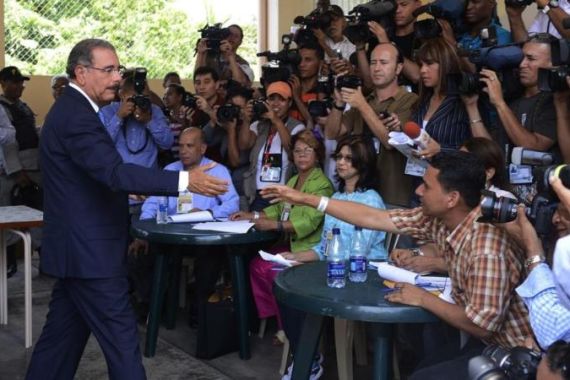Ruling party candidate leads Dominican vote
Danilo Medina, a long-time official of the Dominican Liberation Party, takes early lead in presidential vote count.

Danilo Medina, a long-time official of the ruling Dominican Liberation Party, has taken an early lead in the Dominican Republic’s presidential race in a contest pitting him against a former president.
With 37 per cent of Sunday’s vote counted, Medina led with 51 per cent while former president Hipolito Mejia and his Dominican Revolutionary Party had nearly 47 per cent.
A run-off will be held next month if no candidate manages to get at least 50 per cent of the poll.
Mejia’s representative on the electoral commission accused the ruling party of fraud, saying the former president should have received many more votes than had been reflected in results so far.
“We all know what party the director of the electoral commission belongs to,” he said at a news conference.
Voting appeared smooth, though several people told The Associated Press news agency that backers of Medina were offering people payments of about $15 to vote for their candidate or to turn over their voting cards and withhold their vote for his opponent.
Medina campaign organisers denied the allegations, which have circulated in the country for weeks.
Francisco Alvarez, co-ordinating the 3,000 observers of the civic group Citizen Participation, said many reports had come in from around the country of vote-buying by local workers for both parties.
“Both the PRD and the PLD, in large measure, have been engaging in this practice,” Alvarez said at a news conference.
Vote-buying allegations
Observers from the Organization of American States confirmed several instances of vote-buying but not enough to taint the vote, which was “successful” overall, said the head of the mission, Tabare Vazquez, a former president of Uruguay.
Medina hopes to succeed President Leonel Fernandez, who spent $2.6 billion on major infrastructure projects as a subway system, hospitals and roads to modernise a country that is the top tourist destination in the Caribbean but remains largely poor.
Fernandez is constitutionally barred from seeking a third term. Medina is promising to boost economic growth in the Caribbean country.
Mejia has vowed to fight corruption and create jobs – but his critics point out that when he finished his first presidential term, the country was facing probably the most serious financial crisis in its history.
While the Dominican Republic is far wealthier than Haiti, its poor neighbour on the island of Hispaniola, many Dominicans still struggle to meet their basic needs, prompting some to seek a better life by slipping into nearby Puerto Rico, a US territory.
Many Dominicans blame poor Haitian immigrants for taking their jobs and getting involved in crime, which has doubled in the past decade.
The Dominican Republic is a popular resort spot, famous for its white sandy beaches and golf courses, but it also is the leading Caribbean trans-shipment point for South American drugs, destined for the United States and Europe.
About five per cent of the nation’s 6.5 million eligible voters live overseas, including 220,000 registered in New York state.